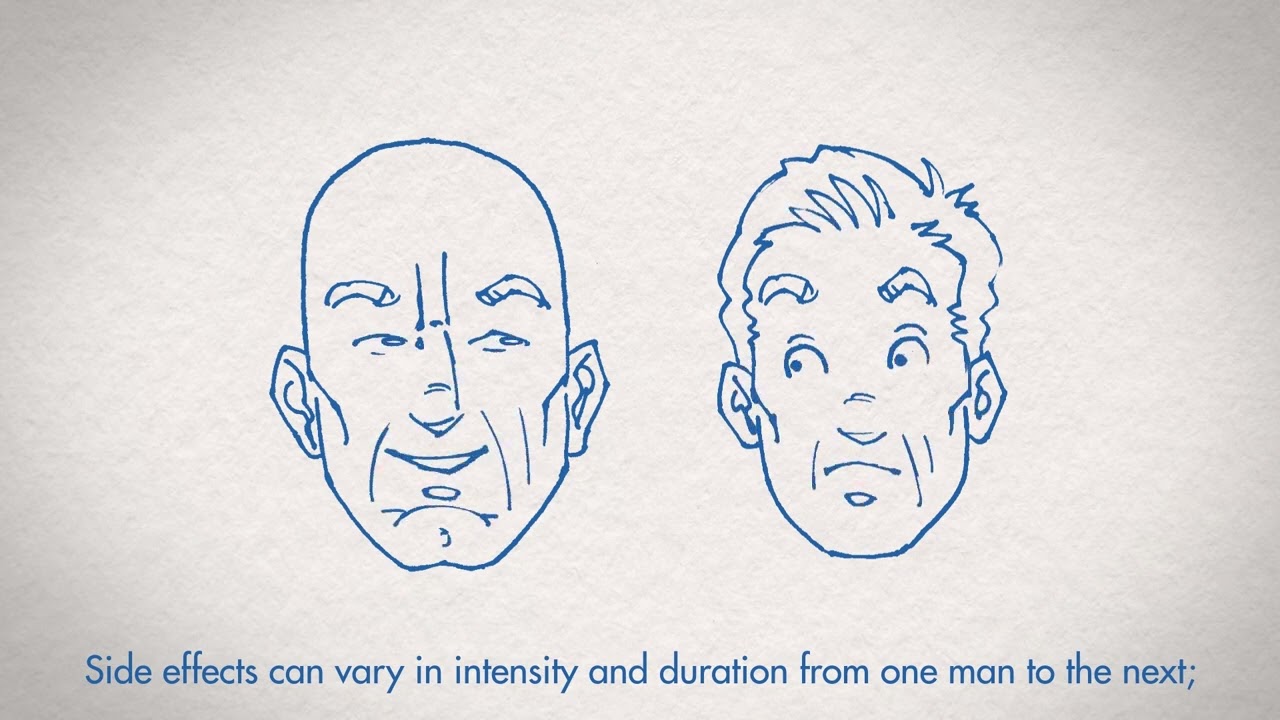Impact on your loved ones
Impact on your loved ones
The diagnosis, treatment, or progression of a disease, such as prostate cancer, in a loved one always requires adjustment for both the person receiving care and the caregiver. If you are a caregiver, this page will help you understand the journey ahead and how to equip yourself well to avoid burnout.
An important, yet demanding role
A natural caregiver, whether it’s a partner, child, friend, or another family member, provides emotional and practical support to someone with a chronic illness. This role, which is part of the care team, comes with new responsibilities, often rewarding but demanding. Natural caregivers may experience various emotions such as joy, fear, anxiety, frustration, and sadness, and may also adjust their lifestyle accordingly.
Each patient experiences the illness differently. The progression of the disease may also vary from one patient to another. Therefore, the natural caregiver must adapt to the patient’s needs.
As a caregiver, you may be required to:
- Listen and discuss with your partner without judgment
- Coordinate medical appointments
- Provide transportation
- Discuss with the medical team
- Keep the family and loved ones informed
- Plan finances
- Provide emotional support
What you may feel and what can help
Examples of coping mechanisms
It is completely normal to experience both positive and negative emotions. For negative emotions, it is common to feel anxious, frustrated, sad, guilty, and powerless. Also, it is normal to cry. Crying helps relieve tension, so don’t prevent yourself from doing so. Each person has their own emotional reaction to these new challenges you are facing. Some coping mechanisms may include:
- Practicing relaxation, with deep breathing or meditation techniques
- Staying active daily
- Adopting a healthy lifestyle – good nutrition, sufficient rest
- Sharing your emotions with a trusted person
- Taking time for yourself and engaging in activities you enjoy
- Keeping a journal to write down your feelings
- Asking for help from your support network
- Appreciating all the precious moments that life brings you.
Forming a support network
Upon the diagnosis of prostate cancer, it is important to form a support network for the patient. This network should include people who can provide you, if needed, with emotional and practical support.
- Recruit them from your close friends and immediate family members, people you have established a trusting relationship with.
- Additionally, to avoid overwhelming the patient with your fears and anxieties, you must develop your own support network.
- Have someone to confide in and rely on at all times. Don’t isolate yourself.
Learning about prostate cancer
Inform yourself about prostate cancer as much as possible. This will help you feel more in control of the situation, facilitate discussions with healthcare professionals, and thus, assist your loved one in making more informed decisions regarding their cancer. It is important that your information search is done from reliable and valid sources.
Relying on communication
Maintaining good communication is essential. Look into the eyes of the person you are speaking to, nod to indicate that you are listening, and ask questions when things are not clear. Talk about how you feel. This will help you both get some of the emotional support you need. It can also help resolve some issues related to the new diagnosis. Sometimes, there is no right or wrong answer; only listening can greatly help.
Providing emotional support
As a caregiver, you will be one of their main sources of comfort and emotional support. You can have a positive impact by respecting their autonomy and need to be alone sometimes while letting them know you are there when needed. You can offer to accompany your loved one to doctor’s appointments, tests, or treatment. If they seem receptive to the idea of your presence, you can:
- help by taking notes and asking questions during appointments;
- prepare a folder with all their medical information, including a list of medications.
You can also gather information from healthcare professionals about treatment options and potential side effects for each treatment. It is important to know that, in general, men are less likely to talk about their health problems and fears.
That being said, discussing your concerns, frustrations, or need for support with your partner is equally important. This will help maintain a healthy relationship throughout this journey. Seeking advice, alone or with your partner, can help you if you are overwhelmed or need to talk to someone else.
Seek help, do not stay alone
Asking for help is a learned skill. As a caregiver, you give selflessly and help your loved one to improve their quality of life. Accepting help is showing empathy towards yourself, it’s preserving your balance. It requires reconnecting with yourself and listening to your needs. It also means recognizing and accepting your limits. This can be quite challenging when you are fully focused on your loved one. Don’t wait to ask for help. From the beginning of the journey, it’s important to know what resources are available to you. Even if you don’t need it immediately, knowing that help is available will reassure you.
Try not to feel guilty
As a caregiver, it’s normal to feel guilty at times. This feeling usually arises when there’s a mismatch between our values and our behaviors. It can occur due to an action, a word, or even the omission of an action. This feeling alerts us and indicates that we need to find a balance between our needs and our obligations. To transform your sense of guilt, you need to change your perspective on the situation. For example, you can say no, take time for yourself, express your emotions, delegate certain tasks, or consult a support professional.
Rest and find pleasure in daily life
Thinking of yourself means setting aside time every day to recharge your batteries by doing what you enjoy. A realistic goal is more likely to be achieved than bold projects! For example, a 20-minute nap, gardening, reading, a 10-minute walk, or a musical break. The key is that the chosen activities match your desires, relax you, and give you the energy you need again.
Discuss with your employer
Your role as a caregiver may affect your job due to possible absences related to your caregiving responsibilities. You can meet with your employer and discuss this situation with them. Reducing the number of hours worked, modifying your tasks, or working from home may be solutions depending on your situation.
As a natural caregiver, you may be eligible for various forms of assistance offered by the Government of Canada. Inform yourself about your situation. Check out our resources page here. And don’t forget that we are here for you.
Other pages that might interest you
Additional Information - Facing cancer

Urologist’s advice: Treatments and information on prostate cancer
Learn more about the role of the urologist and the importance for a patient to gather adequate information after receiving a prostate cancer diagnosis.

How I coped with prostate cancer
A man with prostate cancer shares the challenges of his cancer experience.

Your role as a patient
You’ve been diagnosed with prostate cancer? Your role is as important as that of your medical team.

Diagnosis and treatment
Recently diagnosed with cancer? Educate yourself to fully understand your situation.

Caregivers: Surrounding yourself to help
The evolution of the disease of a loved one always requires adaptation from the person being helped as well as the caregiver. Know that there are resources to support you.

Living Fully, Drinking Moderately
Benefits of Drinking Less and Flavourful Recipes to Guide You Are you aiming for a healthy start to the year by reducing or completely abstaining from alcohol? It can be challenging, especially when many of our social activities revolve around drinking, such as “Happy Hours” or going to a bar with friends for a sporting […]

Rediscovering Well-being After Treatments
After completing treatments, people often feel a mix of concern and relief. The main focus during this transition is rediscovering well-being.

Do you have a curved penis?
Is your penis curved? Does it curve to the left, right, upward, or downward? You have a curved penis and you or your partner want to know why?

Orgasm without erection?
It is entirely possible for a man to achieve orgasm without an erection or penetration and there are several ways to achieve this.

Simple and easy-to-make healthy recipes
Regardless of the season, why not take the opportunity to cook simple and easy-to-make healthy recipes that are rich in nutrients beneficial for your heart and prostate?!

Fresh start with new habits
We don’t have to wait until January 1st to make a fresh start and adopt new habits. This decision can be made at any time during our life.

Does warm milk help you sleep better?
Can a glass of warm milk help you sleep better in the arms of Morpheus? The Rumor Detector wondered if the research has confirmed this.

I am a little bit diabetic
My doctor informed me that I am a little bit diabetic and that I will have to make important changes to my lifestyle.

Caring for your bones in 5 points
Nicknamed “the silent thief” due to the absence of symptoms, osteoporosis is often only detected at a more advanced stage following a fracture.
Sources and references
Last medical and editorial review: April 2024. See our web page validation committee and our collaborators by clicking here.


